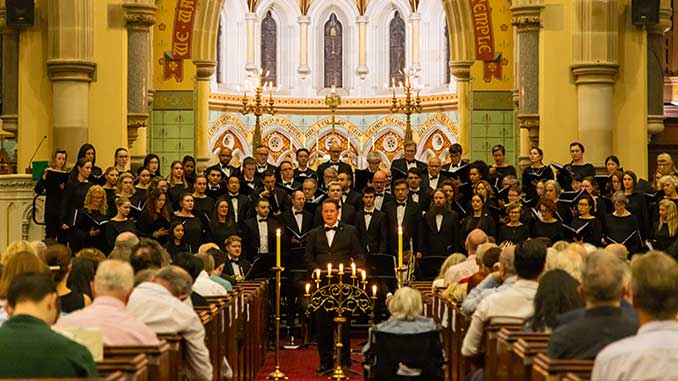 On a day when footy-mad Melburnians celebrated with fervour – together with those less fanatical types who gravitate to the finals like once-a-year Christmas churchgoers – Royal Melbourne Philharmonic’s (RMP) concert presentation, Bruckner Te Deum and Sacred Motets, reminded us all that nothing in life exists in isolation.
On a day when footy-mad Melburnians celebrated with fervour – together with those less fanatical types who gravitate to the finals like once-a-year Christmas churchgoers – Royal Melbourne Philharmonic’s (RMP) concert presentation, Bruckner Te Deum and Sacred Motets, reminded us all that nothing in life exists in isolation.
From one religion of sorts to another, Saturday evening’s combination of a beautifully harmonised chorus, full-bodied brass, impressive organ and four glowing soloists wrapping their love around divine ecclesiastical music, gratifyingly lifted the soul.
At East St Kilda’s historic 19th century Gothic-styled All Saints Anglican Church, RMP artistic director and conductor Andrew Wailes presided over a thoughtfully curated program dedicated to the religiously devout Roman Catholic Austrian composer and organist, Anton Bruckner (1824-1896).
Better known for his nine symphonies, Bruckner composed an extensive body of sacred choral music, including at least seven masses, two requiems, one Magnificat, one Te Deum and smaller choral works including hymns and motets.
The first part of the program covered more than a dozen short works, beginning with Andrew Bainbridge’s smooth control at the church organ in delivering requisite resonant power and solid tempi to Bruckner’s late life Perger Präludium in C major, completed in the same year as the concert’s centrepiece and second part, the Te Deum, in 1884.
Bainbridge also later showcased the muscular heft of the Vorspiel (Prelude in D minor) and the lighter, higher register of the Nachspiel in D minor with aplomb, both of which ended with splendid long sustained notes.
Five works gathered the accomplished forces of the RMP Choir of around 80 voices, the first of which painted the magnificent chromaticism and dynamics evident in Bruckner’s work and considered to be his most famous motet, the 1886 Graduale: Locus iste.
Among others highlights, tenor Michael Petruccelli’s warm and authoritative performance led the rich sound and fused dialogue characteristic of Antiphon: Tota pulchra es, Maria of 1878, with the chorus clearly having faith in their abilities and each other and making the final bars’ diminuendo to extinguishing pianissimo a poignant and ethereal conclusion in its prayer to Mary.
The choir similarly excelled with deeply expressive phrasing and tautly united harmonics in the lofty glory of Graduale: Os justi meditabitur, the setting of Psalm 37: 30-31 and composed in 1879.
Several pieces for brass interspersed the first part, often capturing hints of Wagnerian influence. The mournful Aequale No. 1, the more emotive Aequale No. 2 (both for three trombones) and, especially, the Passion Week hymn to honour the Cross and transcribed for brass, Vexilla Regis. The brass players rose to the occasion, generous in their respectful and evocative renditions that highlighted their instruments’ sonorities with crisp, radiant edges.
The first part concluded with the 1885 Antiphon: Ecce sacerdos magnus, a curious, sometimes overwhelming piece that began with electrifying force and seesawed from a comforting calmness to an almost threatening heavy-handedness, entertaining wayward thoughts alluding to the consequences of failure to comply with religious authority. Some trepidation over the more transparent passages was audible but the strength of the fortissimi confidently surged.
The concert’s second part featured the Te Deum in C major (We praise Thee, O God) – a hymn of praise said or sung at the end of mass or at the canonization of a saint, rejoicing in God as the eternal Father and to whom mercy is beseeched. According to the program notes, Bruckner considered it the pride of his life and it was the only work he ever received money for – a servant of Christ in a very real sense.
In an Australian premiere of a new transcription for organ, brass, 4 soloists and choir by Johannes Ebenbauer – originally scored for full orchestra – the little under 25-minute work demonstrated its splendour and impact.
Champions of operatic singing who often perform locally – soprano Helena Dix, mezzo soprano Dimity Shepherd, baritone Christopher Hillier and tenor Michael Petruccelli – formed a superbly suited quartet.
Petrucelli carried the bulk of the solo work, doing so with unswerving intensity and command. Dix’s gorgeous arabesque sculpting and gossamer notes floated divinely, including in sections where both soprano and tenor alternately communicate.
Shepherd’s injections of darkly tinted opulence and Hillier’s firm and assured singing blended and projected persuasively. But the chorus made up the hulking engine, creating sumptuous dynamics that shifted with precision like a flock of swallows in flight and most affecting in their unaccompanied cadences.
And at maximum power, soloists and choristers combined, the arching finery, fulsome and triumphant sound delivered operatic might at the conclusive C major In te, Domine, speravi.
What the evening revealed was that if the Latin text challenged, or its printed English translation for that matter felt lost to non-believers, the music nevertheless spoke volumes. Much of Bruckner’s writing sets an ambulatory pace that effortlessly carries the listener on a meditative journey.
Wailes’ brief introduction to each piece assisted greatly and the movement of choristers on and off the front altar from the side aisle pews was seamless all in all, in what could be thought of as a more than 170 year old institution still kicking goals.
Bruckner Te Deum and sacred motets
All Saints’ Anglican Church, Chapel Street, East St Kilda
Performance: Saturday 30 September 2023
Information: www.rmp.org.au
Image: Royal Melbourne Philharmonic at the All Saints Anglican Church – photo by Paul Dodd
Review: Paul Selar
